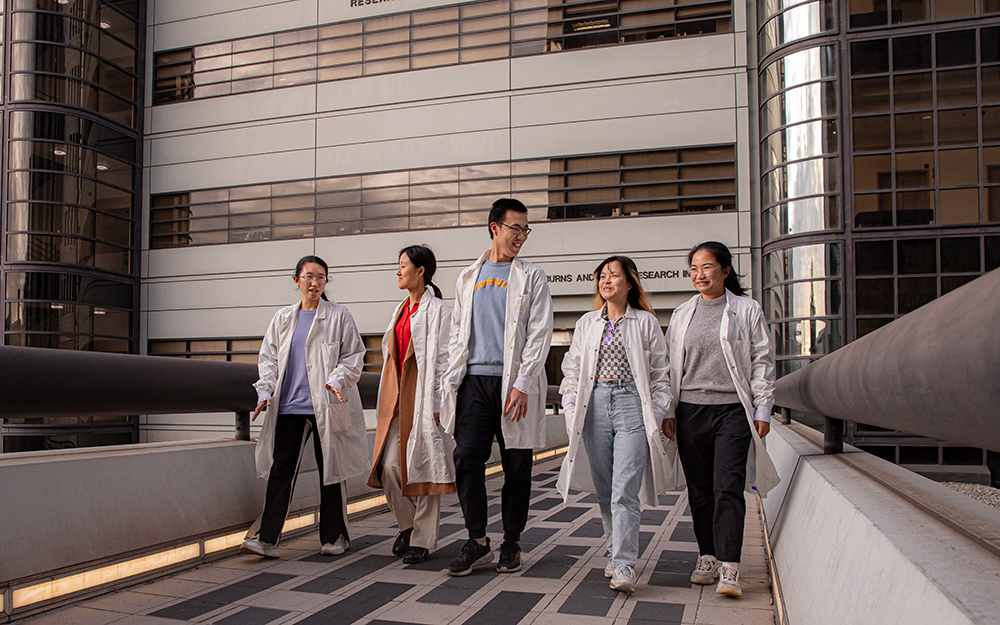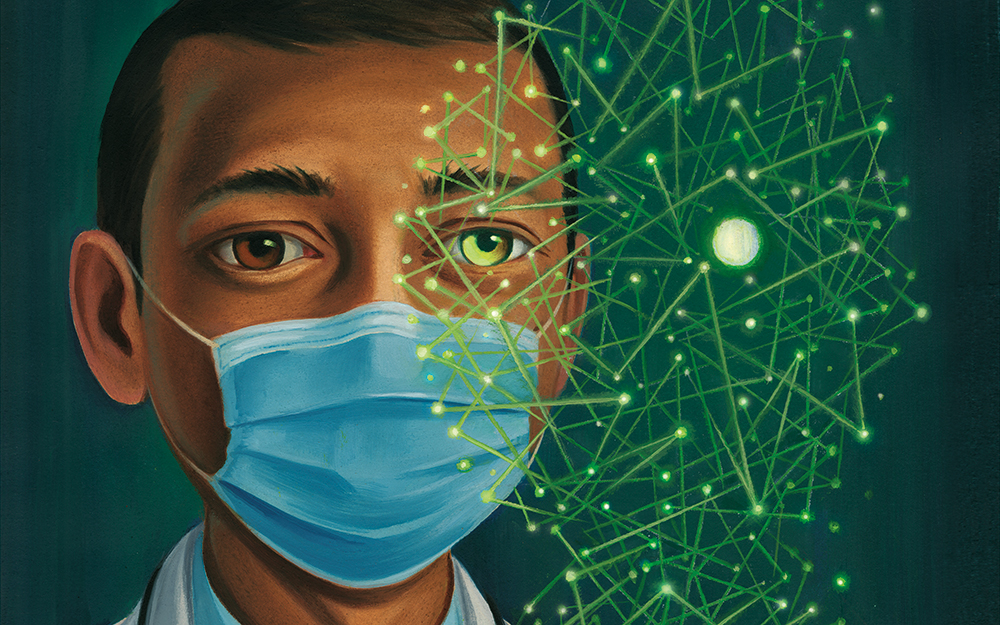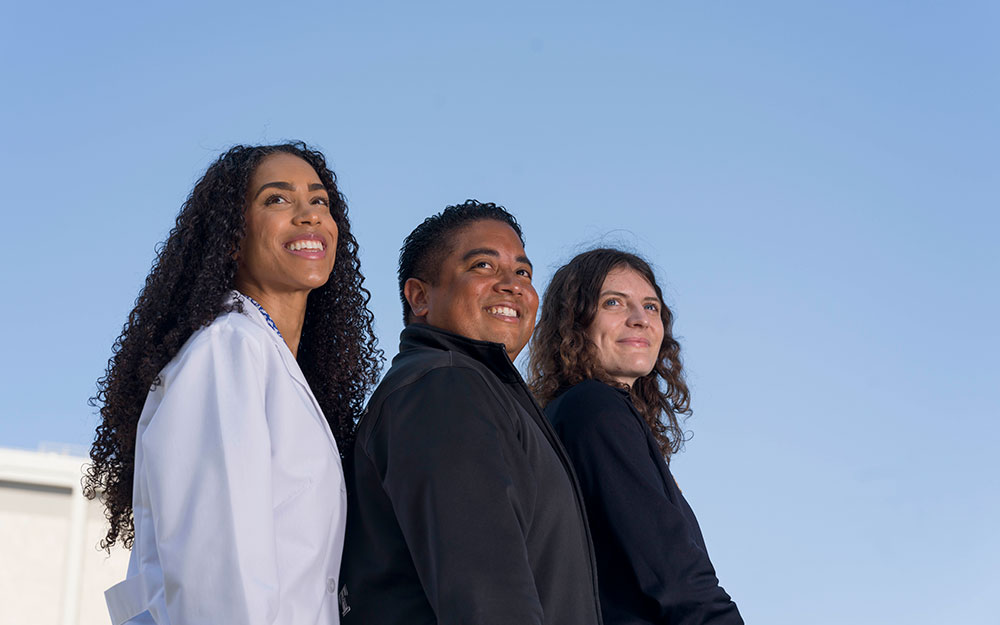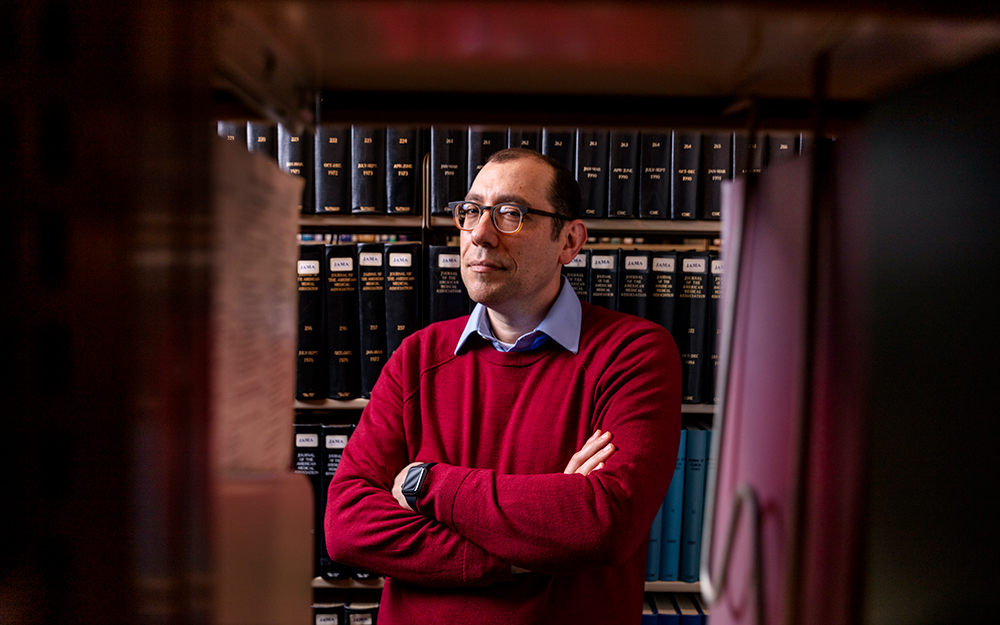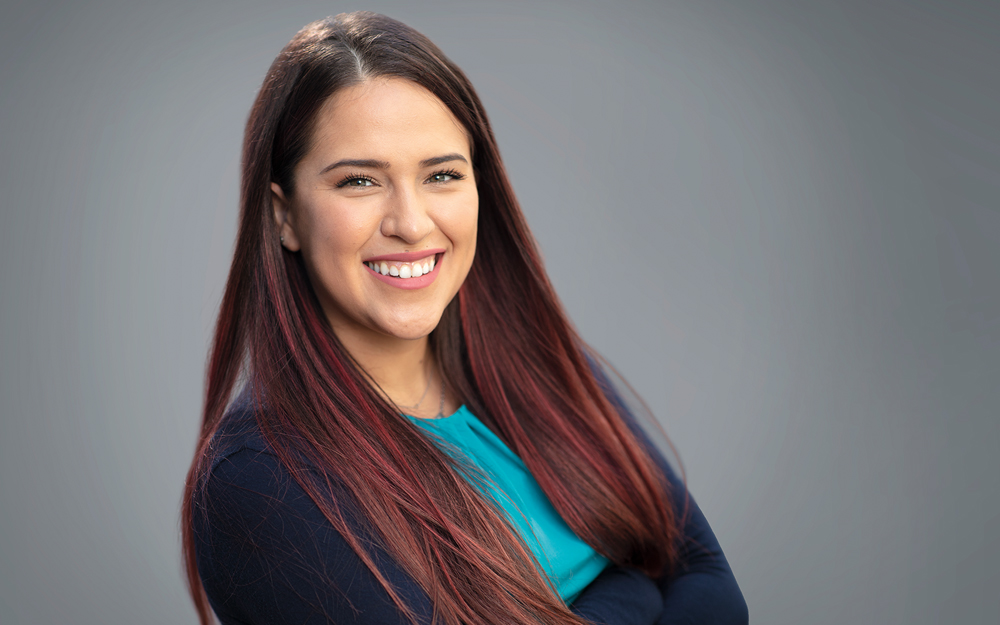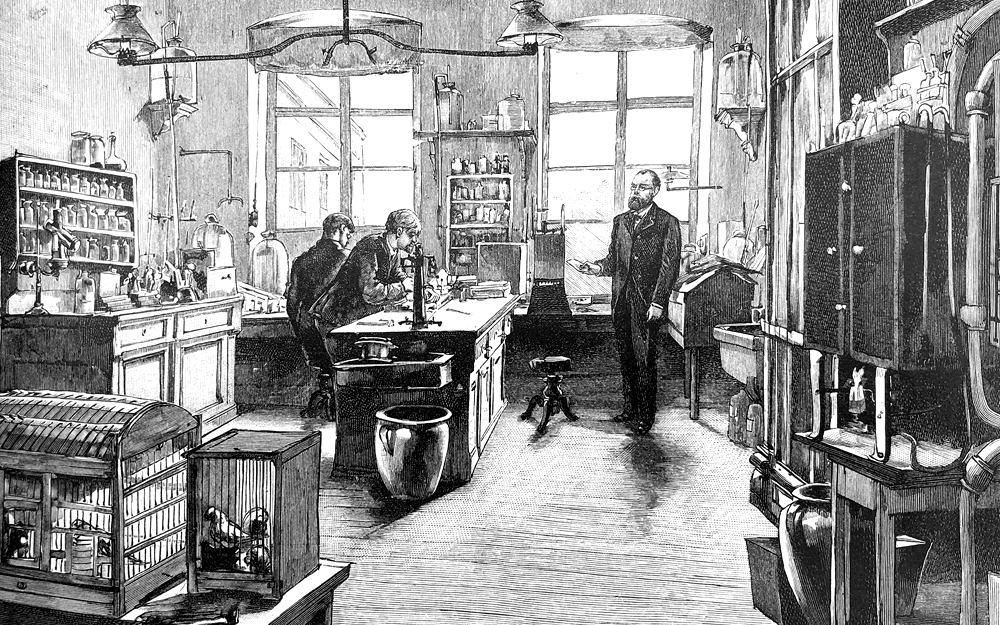Next Generation Health Education
Date
July 10, 2025
Credits

Date
July 10, 2025
Credits
Medical providers featured in this article



In Brief
{{cta-block}}
Cedars-Sinai Health Sciences University is reinventing scientific education and training to meet emerging healthcare needs.
In 2017, Harmon Clarke was pursuing postgraduate studies at the University of Hawaii when his Crohn’s disease flared, requiring specialized care. The Los Angeles native received care at Cedars-Sinai, but two days before Christmas, he developed sepsis.
"I woke up from emergency surgery convinced my life was over," Clarke said. "The pain was unbearable."
Clarke lay in a hospital bed in critical condition when Brennan Spiegel, MD, director of Health Services Research, director of the Master of Science in Health Systems program, and the George and Dorothy Gourrich Chair in Digital Health Ethics at Cedars-Sinai, introduced him to a clinical trial for an innovative pain management tool: a virtual reality headset. Clarke’s headset simulated a helicopter ride over Icelandic fjords, a hike into the Grand Canyon and a swim with dolphins. For the first time in months, his body relaxed. He didn’t need pain medication.
"During my 200-day stay, I met so many students—these brilliant minds who were laser-focused on helping patients feel better," Clarke said. "But I never imagined I would one day join their ranks."
Today, Clarke is pursuing a master of science in health systems degree at Cedars-Sinai’s newly launched Health Sciences University (HSU). The unique degree will prepare Clarke and other graduates for a career in emerging fields such as digital health science, mobile health, health technology assessment, big data analytics and performance improvement.
HSU’s distinctive educational approach emphasizes collaboration across disciplines, with small cohorts of learners focused on specific areas of healthcare. The school is committed to expanding opportunities for all students by offering best-in-class training from the foremost experts and providing access to the most advanced scientific and medical technology, precision techniques, and innovative research trials.
"We are building a university that will offer meaningful career paths that align with Cedars-Sinai's mission to elevate the health status and wellbeing of patients and communities."
A New Model for Healthcare Innovation
HSU is an interdisciplinary academic ecosystem where cell and molecular biologists, neuroscientists, geneticists, computer scientists, health policy experts, biostatisticians, and physicians unite to tackle modern medicine’s biggest challenges. Here, computer programmers develop complex algorithms to accurately triage patients with vague symptoms, laboratory scientists use the most advanced equipment to identify and analyze biomarkers, and practicing physicians develop protocols that enhance the patient experience.
"The school’s diverse programming aims to attract the brightest minds, both inside and outside of medicine, to devote their careers to disease-focused solutions," said Jeffrey Golden, MD, executive vice dean of Research and Education, director of the Burns and Allen Research Institute, and the Linda and Jim Lippman Distinguished Chair in Academic Medicine at Cedars-Sinai. "By pairing the best candidates with world-renowned experts who are vested in their education, learners are equipped to develop the skills necessary to shape the future of healthcare."
Home to more than 315 graduate students and postdoctoral scientists, and 536 medical residents and fellows, HSU offers the following graduate degrees:
- PhD in Biomedical Sciences, merging scientific and translational medicine curricula with mentoring by researchers and clinicians
- PhD in Health Artificial Intelligence
- Master of Science in Health Systems
- Master of Science in Magnetic Resonance in Medicine
- Master of Science in Regenerative Medicine
By seamlessly integrating high-level education into a world-class hospital system, HSU aims to train the next generation of healthcare visionaries. All of HSU’s PhD programs are fully funded. Cedars-Sinai covers tuition to ensure that financial barriers do not stand in the way of innovation.
"We are building a university that will offer meaningful career paths that align with Cedars-Sinai’s mission to elevate the health status and wellbeing of patients and communities," said Shlomo Melmed, MB, ChB, executive vice president of Medicine and Health Sciences, dean of the Medical Faculty, and the Helene A. and Philip E. Hixon Distinguished Chair in Investigative Medicine at Cedars-Sinai.
Learner-Centered Curriculum
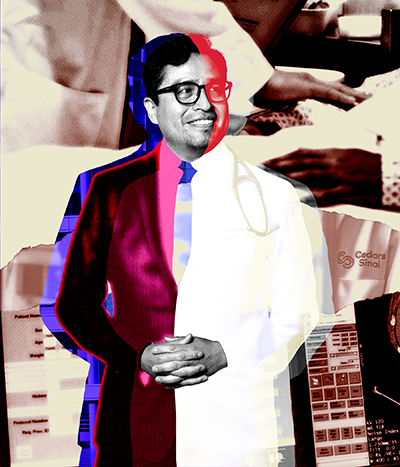
Julio Silvestre, MD, is a practicing palliative care physician who was trained in Bolivia. After further training in internal medicine, palliative care, geriatrics and oncologic emergencies in the United States, Silvestre enrolled in HSU’s Master of Science in Health Systems program to pursue his passion for accelerating the translation of research into clinical practice. He’s particularly interested in addressing the often overlooked disconnect between medical discovery and real-world application.
"Clinical trials are published all the time, but there’s a major gap between when a study is published and when those results are put into practice," Silvestre said.
The Master of Science in Health Systems program trains learners to expedite the implementation of scientific discovery in the clinic.
HSU curates its curricula to meet the demands of a changing healthcare landscape and its shifting priorities. And just as Cedars-Sinai clinicians prioritize patient-centered care, all HSU programs emphasize a learner-centered philosophy. Flexible programming accommodates professionals’ busy schedules.
"Some of our learners are full-time clinicians, while others are traditional graduate students," said Joshua Goldhaber, MD, vice dean of graduate education and the Dorothy and E. Phillip Lyon Chair in Laser Research at Cedars-Sinai. "Our programs are customized to fit their lives and provide exactly what our educators think the students need to be successful in their careers as scientists or healthcare providers."
Faculty facilitate learning by teaching students how to problem solve and devise concrete solutions for medicine’s most vexing problems. Then they provide them with the scaffolding to make their visions a reality.
"The reasoning that leads to creative solutions is a learned skill," said Graciela Gonzalez-Hernandez, PhD, director of the graduate programs in artificial intelligence at HSU. "Our goal is to cultivate learners who are not only knowledgeable but also creative, collaborative and adaptable."
HSU master’s degree and PhD candidates work alongside professors who are among the foremost scientists in their fields on disease-focused research projects that aim to change patients’ experiences now and not years down the line.
"Our faculty advisers are the best in their fields," Silvestre said. "Every time they give us an assignment, they’re not just teaching by theory. They’ve already walked the path."
Graduate learners work on open-ended projects aimed at solving real-world healthcare problems. Many co-author papers presenting their findings in peer-reviewed journals.
Within his studies, Silvestre is contributing critical research to the burgeoning field of palliative care and devising research projects that address an underrecognized facet of medicine: comfort. As a practicing palliative care physician at Cedars-Sinai, he’s especially interested in optimizing the use of pain medications and managing complex symptoms, such as intractable pain syndromes, shortness of breath, mood issues and fatigue.
"We’re asking patients what matters most to them when facing a life-limiting illness such as cancer," Silvestre said. "Then we’re folding those findings into the work we do in the clinic."
Disease-Focused Training
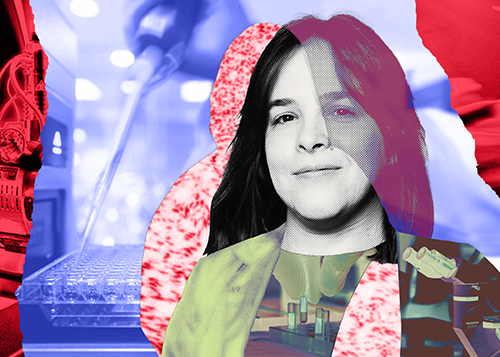
For Basia Gala, a third-year PhD candidate in biomedical sciences, the fight against cancer is personal. After losing close friends and family members to the disease, she chose to enroll in HSU because of its unique focus on translational research that shepherds pioneering lab discoveries into clinical care.
"Many programs focus solely on basic science," Gala said. "I wanted to work on research that could directly translate into clinical applications to improve patient care."
Unlike the many health sciences programs that reserve clinical training for medical students, HSU provides learners with direct experience in the clinical environment. This includes at least 20 hours of clinical rotations, where learners work alongside physicians, analyze patient data, and use the most advanced tools and equipment. Additionally, doctoral candidates complete three rotations in dissertation labs under the guidance of the most brilliant minds in medicine.
"Translational science is at the crux of everything we do at HSU," Goldhaber said. "The close integration in the hospital makes it possible to accelerate discovery into clinical practice."
Under the mentorship of Helen Goodridge, PhD, associate director of the Board of Governors Regenerative Medicine Institute, Gala is researching the immune microenvironment in solid tumors and specifically in soft-tissue sarcomas, which are cancers that are often resistant to chemotherapy and immunotherapy. The Goodridge Laboratory at Cedars-Sinai studies the production and diverse functions of monocytes and macrophages, which are key players in innate immunity and inflammation. Basia aims to uncover mechanisms that could enable immune infiltration into these poorly immunogenic tumors to ultimately improve treatment outcomes.
An Environment of Learning

Angel Liu has always been fascinated by the brain and the mechanisms of how it interacts with various neurological diseases. Liu, who is a clinical research associate in the Sati Research Laboratory at Cedars-Sinai, was drawn to HSU’s Master of Science in Magnetic Resonance in Medicine program.
Leading neuroimaging scientist Pascal Sati, PhD, mentors students in using advanced MRI technologies and machine learning to improve diagnosis and prognosis in neurological diseases such as multiple sclerosis (MS) and Alzheimer’s disease.
Liu’s current focus is on emerging imaging biomarkers that look at various characteristic of brain lesions that are relevant to MS. These imaging advances aim to improve early disease detection and diagnosis specificity. She’s also interested in studying functional MRI (fMRI) technology, particularly as it relates to tracking brain development during stages of pre- and-postnatal development.
"There are so many fascinating topics to explore with imaging," Liu said. "We’re learning how MRI can detect early-stage cancers and many other diseases long before traditional methods."
HSU’s location in one of the largest metropolitan communities in the country provides learners with access to the most complex cases in medicine as well as the most advanced technology across myriad disciplines.
"Being able to work and learn at the same time is as hands-on as it gets," Liu said. "We’re able to see research translated in real time with the patients we see in the clinic today."
Coming Full Circle
Clarke’s path from critically ill patient to healthcare researcher captures the spirit and vision of HSU. Supported by a Cedars-Sinai scholarship and with Spiegel as his adviser, he is now investigating how wearable devices could predict and prevent Crohn’s disease flares by tracking biomarkers such as heart rate variability, digestion patterns and sleep.
"When I told Dr. Spiegel, while I was lying in a hospital bed, that I wanted to transition into a healthcare career, he suggested I apply to HSU," Clarke said. "He wasn’t just offering me a chance at healing. He was giving me a purpose."
Today, Clarke works alongside physicians, researchers and nurses on projects aimed at proactive, technology-driven healthcare. Like all HSU students, Clarke is also part of a small, dynamic cohort of learners who are dedicating their careers to enhancing patients’ lives.
"I never thought I’d be healthy enough to give back," Clarke said. "Now, I’m not only healing myself, but I’m helping others, too."
A few months ago, Clarke even returned to Maui to swim with the dolphins—this time in real life.
Health Sciences University at a Glance
Building on Cedars-Sinai’s legacy of fostering continuing education, Health Sciences University seamlessly integrates clinical, basic and translational scientific research education into an academic medical center. The university offers robust career paths in graduate and medical education as well as specialized vocational programs, including:
- Graduate Medical Education: Residents and fellows develop personal, clinical and professional competence under the guidance and supervision of acclaimed faculty.
- Graduate School of Biomedical Sciences: Graduate research programs offer unparalleled training opportunities at every stage of a student’s career, preparing them to serve as scientists in clinical settings and teaching best practices in value-based healthcare delivery.
- Chuck Lorre Allied Health School: Professionals choose from a suite of programs to advance their technical skills in respiratory therapy, pharmacy technician training, clinical laboratory science, MRI technology, radiologic technology or echo/cardio technology—areas identified as the most in-demand staffing needs in hospital settings.
- Professional Training Programs: HSU offers non-degree educational certifications, formal trainings, internships and other ongoing opportunities to benefit students and professionals at all levels of their careers.
- Women’s Guild Simulation Center: The Women’s Guild Simulation Center for Advanced Clinical Skills features an immersive environment equipped with the latest in human patient simulators and medical devices.
- Continuing Medical Education: HSU’s CME courses keep healthcare professionals updated on the latest research and best practices, enhancing their skills and improving patient outcomes.


